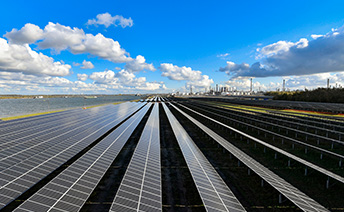Canadian Association of Petroleum Producers (CAPP)
CAPP represents large and small companies that explore, develop and produce natural gas and oil in Canada.[1] Its member companies produce 80% of Canada’s oil and natural gas.[2] CAPP’s mission is to advocate and enable economic competitiveness and safe, environmentally and socially responsible performance by Canada’s upstream oil and gas industry.[3]
Membership of board/executive committee: Shell is a member of the board of governors.
- 2022 assessment outcome: Some misalignment
- 2021 assessment outcome: Aligned
Summary
Shell benefits from its membership of CAPP, especially through CAPP’s role as a platform for presenting a unified voice to government and the public on upstream policies and topics, such as climate, carbon leakage, health and safety, and engagement with Indigenous Peoples and other stakeholders.
We have found CAPP to have some misalignment with our climate and energy transition-related policy positions.
We will urge CAPP to:
- State a position in support of ending routine flaring by 2030 or sooner.
We will encourage CAPP to:
- Explicitly support decarbonised hydrogen and policies that enable different ways to produce decarbonised hydrogen, including hydrogen produced by electrolysis and natural gas reforming with carbon capture and storage (CCS), and hydrogen-based fuels, based on life-cycle analysis greenhouse gas (GHG) intensity measures. We encourage CAPP to publish more information on its website about its advocacy in relation to decarbonised hydrogen.
- State a position to ensure that nature-based solutions complement, and do not displace, efforts to avoid and reduce GHG emissions.
- Build upon its reports on the sector’s environmental social and governance (ESG) performance to advocate in support of common standards and benchmarks to allow comparison of ESG reporting.
- Provide information on its website about its support for accelerating electrification with renewable and low-carbon power sources.
We will remain a member of CAPP at the current time. We will continue to track alignment between CAPP’s climate and energy transition-related positions and our own and will be transparent about where we find differences. We will continue to engage the association in areas where we have different views, including through our involvement in CAPP’s climate policy committees and board.
Further information
Click on the sections below to read more.
Paris Agreement and net-zero emissions
- CAPP has stated it will “work with government(s) to meet emissions reduction objectives and the ambition of the Paris Agreement, to which Canada is a signatory, as a global framework for addressing the risk of climate change.“[4]
- CAPP has stated support for the Canadian government’s target to achieve net-zero emissions by 2050.[5]
Carbon pricing
- CAPP states that “carbon pricing mechanisms, when implemented properly, can be an effective means to reduce emissions.”[6] Canada has a carbon pricing system.
- CAPP does not support the federal government’s proposed oil and gas emissions cap, set out in its 2030 Emissions Reduction Plan. In a March 2022 letter to government, CAPP reiterated its statement that carbon pricing mechanisms “when implemented properly, can be an effective means to reduce emissions” and that “the output-based pricing system has been an important driver of climate innovation in our industry and others.”[7] In a September 2022 submission to government about the emissions cap, CAPP stated that although it shares the stated goals in the government’s discussion paper, “it is the industry’s opinion the two proposed emission cap options on Canadian oil and natural gas emissions are unlikely to reduce global emissions.”[8] CAPP stated it is concerned that the cap “separates the oil and natural gas sector from existing carbon pricing programs and thus will impact both the price and overall demand for offset credits”; CAPP stated that “any new climate policy should be economy-wide and encourage the lowest-cost reductions across the economy.”[9] CAPP’s view is largely aligned with Shell’s position on the proposed oil and gas emissions cap.
Energy efficiency
- CAPP has stated support for improving the energy efficiency of existing facilities.[10] It has not stated a position on improving energy efficiency through standards and regulatory instruments.
Decarbonised hydrogen
- CAPP has provided information about blue and green hydrogen on its website. However, it has not explicitly stated support for decarbonised hydrogen in its publicly available submissions.[11] [12]
Natural ecosystems
- CAPP has stated support for “international and domestic offsets including those from nature”.[13] However, it has not stated a position to ensure that nature-based solutions complement and do not displace efforts to avoid and reduce greenhouse gas emissions.[14]
Carbon capture and storage
- CAPP has stated support for the “development and deployment” of carbon capture, utilisation and storage (CCUS).[15]
- In its September 2022 response to the proposed federal oil and gas emissions cap, CAPP stated that the industry supports additional goals for policy development to “advance carbon capture, utilization and storage (CCUS) technology as a major emission reduction opportunity in several sectors, including improved incentives similar to those in the U.S.”[16]
- In its September 2022 response to the government’s Environmental Performance & Economic Competitiveness: Making Canada a Low Carbon Global Supplier of Choice – Carbon Capture, Utilization, & Storage Investment Tax Credit Consultation, CAPP stated support for the federal government’s CCUS Investment Tax Credit (ITC), noting that it believes the “planned CCUS tax-credit policy is a significant step forward in federal support for emissions-reducing technology and our climate goals.”[17]
Environmental, social and governance (ESG) standards and benchmarks, sustainable finance taxonomies
- CAPP provides reports on industry ESG performance on its website.[18] CAPP has not stated positions in support of common standards and benchmarks to allow comparison of ESG reporting.
Coal
- CAPP has stated support for fuel switching from coal to natural gas.[19]
Electrification with renewable or low-carbon power
- CAPP states that renewable energy can be used to power all or part of a natural gas or oil facility.[20]
- CAPP states an interest in working with government to explore how the Investment Tax Credit proposed for clean energy can be applied to the electrification of upstream oil and natural gas operations.[21]
Gases and methane
- CAPP has stated that “Canadian oil and gas has a critical role to play in the integrated energy systems and is part of the global solution needed to tackle the global climate challenge”, adding that “any pathway to net zero includes the efficient use of oil and natural gas.”[22]
- In September 2022, CAPP stated that “natural gas has a significant role to play in a lower-carbon future and policy should encourage the production and utilization of natural gas for electricity generation, petrochemicals, and low carbon-intensity fuels like hydrogen either domestically or globally.”[23] In November 2021, it was signatory to a paper that highlighted the role of natural gas as a partner to intermittent renewable energy.[24]
- CAPP has stated support for the direct regulation of methane emissions.[25] [26] [27] [28] CAPP’s website states “Canada’s regulated and voluntary measures for reducing methane emissions are models for other jurisdictions worldwide.”[29]
- In its December 2022 response to Canada’s proposed methane regulatory framework to achieve its 2030 targets, CAPP stated that it recognised “methane emissions to be one of the highest potential greenhouse (GHG) abatement opportunities for our industry and we support taking actions that lead to further reductions of methane emissions”.[30] CAPP also stated its support for working with government to help achieve the targets.[31]
- CAPP supports reducing flaring but has not stated a position on ending routine flaring by 2030 or sooner.[32]
Road transport: Passenger cars and vans
No position
Road transport: Heavy-duty vehicles
No position
Heavy industry decarbonisation
No position
Aviation
No position
Shipping
No position
Return to list of associations[1] https://www.capp.ca/about/
[2] https://www.capp.ca/about/
[3] https://www.capp.ca/about/capp/
[4] https://www.capp.ca/explore/industrys-climate-commitment/
[5] https://www.capp.ca/news-releases/capp-statement-canadian-net-zero-emissions-accountability-act/#:~:text=CAPP%20
[6] https://www.capp.ca/explore/industrys-climate-commitment/
[7] https://www.capp.ca/wp-content/uploads/2022/03/Letter-to-Minister-Guilbeault-and-Minister-Wilkinson.pdf
[8] https://www.capp.ca/wp-content/uploads/2022/09/Emission-Cap-Letter-Sept-29-2022.pdf
[9] https://www.capp.ca/wp-content/uploads/2022/09/Emission-Cap-Letter-Sept-29-2022.pdf
[10] https://www.capp.ca/explore/industrys-climate-commitment/
[11] https://www.capp.ca/wp-content/uploads/2022/05/Canadas-Natural-Gas-and-Oil-Emissions-Ongoing-Reductions-Demonstrable-Improvement-394473.pdf
[12] https://context.capp.ca/energy-matters/2021/og101-blue-hydrogen/ (accessed 23 November 2022)
[13] https://www.capp.ca/explore/industrys-climate-commitment/
[14] https://www.capp.ca/explore/industrys-climate-commitment/
[15] https://www.capp.ca/explore/industrys-climate-commitment/
[16] https://www.capp.ca/wp-content/uploads/2022/09/Emission-Cap-Letter-Sept-29-2022.pdf
[17] https://www.capp.ca/wp-content/uploads/2022/10/CCUS-ITC-Submission-Sept-2022.pdf
[18] https://www.capp.ca/resources/reports/
[19] https://www.capp.ca/wp-content/uploads/2022/09/Emission-Cap-Letter-Sept-29-2022.pdf
[20] https://www.capp.ca/environment/innovation/
[21] https://www.capp.ca/news-releases/capp-response-to-the-federal-governments-fall-economic-statement/
[22] https://www.capp.ca/explore/industrys-climate-commitment/
[23] https://www.capp.ca/wp-content/uploads/2022/09/Emission-Cap-Letter-Sept-29-2022.pdf
[24] https://www.capp.ca/wp-content/uploads/2021/11/COP-26-Industry-Discussion-Paper-398748.pdf
[25] https://www.capp.ca/wp-content/uploads/2021/02/Managing-Methane-Emissions-for-Natural-Gas-and-Oil-Development-386197.pdf
[26] https://www.capp.ca/wp-content/uploads/2021/11/COP-26-Industry-Discussion-Paper-398748.pdf
[27] https://www.capp.ca/wp-content/uploads/2021/11/COP-26-Industry-Discussion-Paper-398748.pdf
[28] https://www.capp.ca/wp-content/uploads/2021/11/COP-26-Industry-Discussion-Paper-398748.pdf
[29] https://www.capp.ca/wp-content/uploads/2021/11/COP-26-Industry-Discussion-Paper-398748.pdf
[30] https://www.capp.ca/wp-content/uploads/2023/03/20221212-CAPP-Submission-RE_-Methane-Framework.pdf (accessed 2 March 2023)
[31] https://www.capp.ca/wp-content/uploads/2023/03/20221212-CAPP-Submission-RE_-Methane-Framework.pdf (accessed 2 March 2023)
[32] https://www.capp.ca/wp-content/uploads/2021/02/Managing-Methane-Emissions-for-Natural-Gas-and-Oil-Development-386197.pdf










